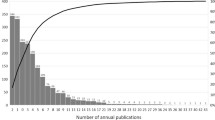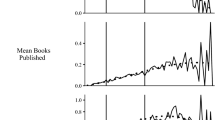Abstract
The research productivity of psychologists holding appointment in British universities was studied within a cross-sequential design. Publication rates in 1968–1970 and 1978–1980 were compared across groups differing in terms of chronological age and date of birth. At both times of measurement psychologists above 45 years of age published less frequently than younger psychologists. Psychologists who held appointment in 1980 as well as 1970 published less frequently in 1978–1980 than in 1968–1970, irrespective of their age in 1970. Although productivity dropped with age, there was considerable variability in output between younger and older psychologists. Further, a person's publication rate in 1978–1980 was better predicted by their past productivity (publication rate in 1968–1970) than by their age. These results are discussed in the context of factors that affect research productivity, as well as changes that will occur in the age distribution of British academics over the next 20 years.
Similar content being viewed by others
References
Bayer, A. E. and Dutton, J. E. (1977). “Career age and research-professional activities of academic scientists,” Journal of Higher Education 48: 259–282.
Cole, S. (1979). “Age and scientific performance,” American Journal of Sociology 84: 958–977.
Dennis, W. (1956). “Age and achievement: a critique,” Journal of Gerontology 11: 331–333.
Kidd, C. V. (1981). “New academic positions: the outlook in Europe and North America,” Science 212: 293–298.
Lehman, H. C. (1953). Age and Achievement. New Jersey: Princeton University Press.
Rushton, J. P. and Endler, N. S. (1977). “The scholarly impact and research productivity of departments of psychology in the United Kingdom,” Bulletin of the British Psychological Society 30: 369–373.
Rushton, J. P. and Meltzer, S. (1981). “Research productivity, university revenue, and scholarly impact (citations) of 169 British, Canadian, and United States universities,” Scientometrics 3: 275–303.
Schaie, K. W. (1973). “Methodological problems in descriptive developmental research on adulthood and aging,” Ch. 12 in J. R. Nesselroade and H. W. Reese (eds.), Life-span Developmental Psychology: Methodological Issues. New York: Academic Press.
Schaie, K. W., Labouvie, G. V. and Buech, B. V. (1973). “Generational and cohortspecific differences in adult cognitive functioning: A fourteen-year study of independent samples,” Developmental Psychology 9: 151–166.
Schaie, K. W. and Parham, I. A. (1977). “Cohort-sequential analyses of adult intellectual development,” Developmental Psychology 13: 649–653.
White, K. G. and White, M. J. (1978). “On the relation between productivity and impact,” Australian Psychologist 13: 369–374.
Williams, G. L., Blackstone, T. and Metcalf, D. (1974). The Academic Labour Market: Economic and Social Aspects of a Profession. Amsterdam: Elsevier.
Author information
Authors and Affiliations
Rights and permissions
About this article
Cite this article
Over, R. Does research productivity decline with age?. High Educ 11, 511–520 (1982). https://doi.org/10.1007/BF00194416
Issue Date:
DOI: https://doi.org/10.1007/BF00194416




